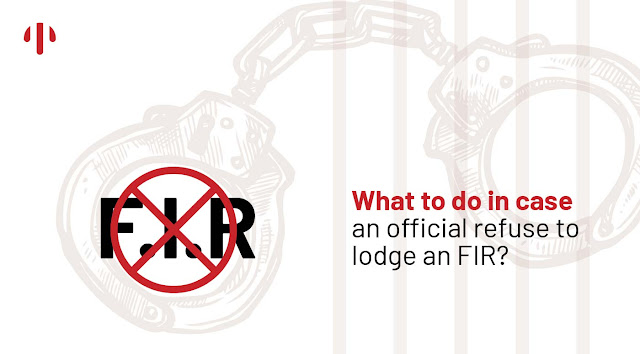What to do in case an official refuse to lodge an FIR?
Section
154 of The Code of Criminal Procedure deals with registration of First
Information Report (though the Section does not use the word ‘First Information
Report or FIR). Know your rights on how to file an FIR in India,
procedures of filing an FIR both through physical and online FIR filing
system. Know everything about filing FIR in India and how to
escalate the situation if any official refuses to file a complaint.
How to file an FIR in India?
One can
do online FIR registration or online police complaint about
cognizable crimes. Non-cognizable crimes require submitting a complaint to the
magistrate. The magistrate, in turn, directs police for action.
A
“cognizable” crime covers for example murder, rape, rioting, dacoity, etc.
These are the crimes where arrest can be made without a warrant. A
“non-cognizable” crime covers cheating, fraud, etc. There is a difference
between an FIR and a complaint.
A First
information report is the report of crime or civil issues that the police
receive first in point of time. The commission of the crime or the police has
the right to arrest without warrant and can start the investigation. The
complaint refers to an appeal made to the magistrate, comprising an allegation
that a crime has taken place.
You can
file FIRs online. You can always find relevant information and get contact
information from each State’s Human Rights Commission office. It can be through
the website of the National Human Rights Commission http://nhrc.nic.in
Moreover, it is not necessary to go to the police station if the police ask you
to visit, unless the police are arresting you on criminal grounds.
Grounds for the arrest of a citizen
Police
can summon you to the police station in case you are a witness, suspect or have
a perceived part in the crime. The police cannot take you with them while you
are walking outside or you are at home if you haven’t done anything illegal.
Unless they have a substantial reason, you have the right to refuse to go with
them anywhere.
Police
can only question a woman or children under 15 years in their homes. They don’t
have to visit the police station.
Let us
summarize how you can file FIR in India (First Information Report).
Register your complaint at the nearest police station. It can be done at the
locality where the offence is allegedly committed, or where the victim resides
or carries on business.
The
concerned police officer in the police station may register an oral FIR. One
can make a written complaint. Which is then converted to the FIR format.
The
concerned Police officer, after recording the FIR in the prescribed form, will
explain the contents of the said FIR. The complainant then has to sign over in
the said recorded FIR.
The
Police are obliged to give FIR to the complainant. It should be noted that an
FIR can even be registered by a person who is alleged to have committed a
crime.
What steps to take if the police refuse to register
an FIR?
Send your
complaint in writing to the Superintendent of Police (SP) through registered
post.
Send a
complaint to the concerned State Human Rights Commission or the National Human Rights Commission.
Mention that the police are not enforcing the law or that they are being
negligent and corrupt.
It is a
crime to refuse to file FIR in India.
Refusal
to lodge an FIR on jurisdictional ground amounts to 1 year of Imprisonment for
the Police officials.
A
petition can be filed and submitted to the Chief Justice of the concerned High
Court / Chief Justice of India, Supreme Court. It requests to take Suo Moto
Cognizance of the alleged contempt of the court. A copy of the letter is also
sent to the concerned police officer. One can check for the status of the
petition through an application under the Right to Information (RTI).
How to escalate your complaint?
Know that
you can:
- Complain to the superintendent of police
- Approach to a judicial magistrate with your plea
- File the writ petition
- Complain to the state and national human rights commission.
You can
write the complaint of your case and can send it by post to the senior officer
of the police, Commissioner of Police or Superintendent of police. First, the
superintendent analyses the complaint. Then sent to the High Court Chief
Justice of the State.
A copy of
the online police complaint is sent to the Chief Justice of the High
Court of the State once it is analyzed by the Superintendent of the police.
You may
send a written complaint in the form of the letter to the Concerned judicial
metropolitan magistrate. After analyzing the letter magistrate will decide
whether to take cognizance or not. An informant may also send an application to
the judicial magistrate.
You can
even file a writ petition in the Hon’ble High Court for the issuance of writ of
mandamus against the defaulting police officer. To give the reason why he has
not registered the FIR, and why he should not be suspended from his position of
police service for interfering in the administration of justice and disturbing
the accused person.
Right to Compensation
A citizen
can ask for damages/compensation, for the frustration and for the deprivation
of life and liberty under Article 21 of the Indian constitution.
You can
file a case with the State human rights commission or National human rights
commission in written form. You will mention that the concerned police officer
is not doing his duty. Disregarding law. Stating the disregard for the victim’s
problems that could create a situation of mental trauma or frustration for the
victim.
If a
police official misuses their power against less privileged or someone who
cannot read or write, an Application u/s 156(3) or Criminal Complaint u/s 200
of CRPC, 1973, can be filed. Also filed orally before the competent magistrate.
But in
the recent era, things have been changed now. Refusing to file FIR is an
offence. Follow up the above guidelines and do not be silent on the crime. The
one who is doing the crime is equally responsible as the one who is suffering
from it.




Comments
Post a Comment